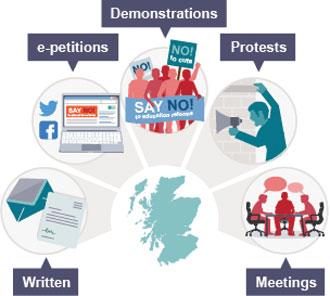
|
 |
 |
|
|
|
|
|
|
|
|
|
|
|
|
|
|
|
|
|
|
|
|
|
|
The Contentious Relationship Between Bahrain
|
 |
All civil or human rights organizations in all parts of the world are in reality pressure groups (lobbies) in the sense that they press those in power to achieve specific goals that benefit its members such as the trade unions which are established to protect the interests of specific categories such as doctors, engineers, journalists and workers; or those that exert pressure on decision makers to improve the situation pertaining to issues that are in the interest of the general public such as the environmental campaigners, human rights or other organizations.
The role or function of these pressure groups is to mobilize forces and efforts through media campaigns and petitions to members of the parliament, cabinet ministers and others who occupy influential posts. They could also work to sway domestic and sometimes international public opinion to achieve their goals.
When the Bahraini government opened the door to the establishment of hundreds of NGO’s, it should have anticipated coming under some form of pressure to either reform policies, amend legislations or further other causes.
For example, those advocating for women rights, environment, workers or the handicapped will carry out their main task by highlighting the shortcomings in government performance and legislations, then launch awareness campaigns to enlighten the public on the hardships faced by those they are standing up for. Following that, they would proceed to mobilize and sign up those willing to work and volunteer for the cause, then they would address the authorities, seek the support of their counterparts in similar organizations at home or abroad, convene conferences and criticize the government’s lack of action or slow response.
What all this means is that NGO’s carry out a persistent pressure campaign and that every time authorities implement certain demands, they move on to press for more demands and would only stop when international standards stipulated by international agreements and treaties ratified by the state are met. Even in cases where a country has not acceded to a particular international convention, the pressure does not subside but rather more domestic and international pressure would be applied to push for the ratification and subsequent adherence to those treaties. This happened in Bahrain and elsewhere and is still taking place in scores of countries all over the world.
Therefore the decision makers and officials in the concerned government should not denounce the existence of NGO’s pressure whether local or foreign. They should not ask questions such as; “why did they not stop criticizing us?” “Why did they not appreciate our efforts?” “Why are they singling us out?” “Why focus on deficiencies and negatives and not look at the pros and achievements?”
These questions may not be relevant because the basic premise of the work of these groups is to examine the shortcomings and push to rectify them and achieve greater results for those they are campaigning on their behalf. Though some fleeting praise might come the government’s way within the general context, it must be noted that the role of the NGO’s is not to allot large spaces for commendation and flattery of the state, as they are primarily interested in tracking and remedying other deficiencies then moving on to other causes.
Secondly, resorting to the principle of state sovereignty as a line of defense against allegations of abuse is no longer a viable excuse to prevent international human rights organizations from intervening in the internal affairs of any country in the world.
 |
The concept of sovereignty can no longer be used elaborately to argue that a country has the right to do what it pleases on its territory and amongst its subjects.
The decrying assertions by any government such as “Why are others interfering in our affairs?” or the tendency to address the international human rights community, whenever there is criticism, on the grounds that the state can do whatever it sees fit, or the insistence that the state is merely implementing local law. All these types of responses live in a virtual world that does not exist in contemporary international relations.
Why do these arguments not hold water?
The answer simply lies in the fact that the issue of human rights and other causes are now enshrined in international law, United Nations Charter as well as conventions acceded to by the states. Therefore the non-implementation of these treaties is deemed as a breach of the state’s obligations.
In the past, countries were interested in international law only in terms of the regulation of relations with other states, and each country was able to do what it wanted within its territory and among its people.
But times have now changed as the international community has established mechanisms that allow it to pursue, hold accountable, monitor, follow up and even prosecute. Internal affairs are no longer the sole property of governments.
We now live in a world that collectively share the same human rights concepts while Societies and human rights organizations share the burden of defending people whoever and wherever they are. In today’s world of globalization, there is a consolidation of the organizations that work in the same field (environment, human rights, women, press freedom), whereby local human rights groups have now become part and parcel of the larger human rights community in the world and thus benefit from its support and advocacy.
On the other hand, the states are now domesticating international treaties and laws by incorporating them into their legal system. As such it is inconceivable that anyone would refer to local laws when the state itself has ratified treaties that impose obligations other than those contained in the domestic law and that also compel it to amend its domestic legislations in order to conform to the international law.
This means that the state cannot isolate or separate itself from what is happening in the world even if it has not ratified a certain treaty. The reason being is that the majority of the international community has acceded to it, so the state would then be bound by it from a moral and customary standpoint (granted of course that the state can express reservations on certain clauses without undermining the substance of the convention.) It also means that any state must now address the international human rights community using its language and abiding by its standards, and must also understand the provisions of international conventions whenever others interfere in a specific internal issue that falls within the premises of those treaties.
To sum it all up, it is no longer possible to isolate citizens or local human rights organizations from the impact of the outside world. There is now something big in common between the entire humanity in terms of concepts, mechanisms and tools. Even if a state decides to abolish or bar the establishment of NGO’s this will not change the fact that there will continue to be international human rights organizations that will defend people’s rights, and criticize governments’ actions and coordinate with local activists who will defy the ban and continue to communicate through the media and modern social networking sites which cannot be controlled by the state.
No country in today’s world could isolate itself from the global concepts or the international humanitarian law that is built on them, nor can it stay immune from its effects on local policies and conditions. Whether the state chooses to cooperate with or boycott the international human rights community, it will not make the impact go away. All choices come with consequences, and the choices for states do not have to be black versus white but rather based on which options are more useful or less harmful.